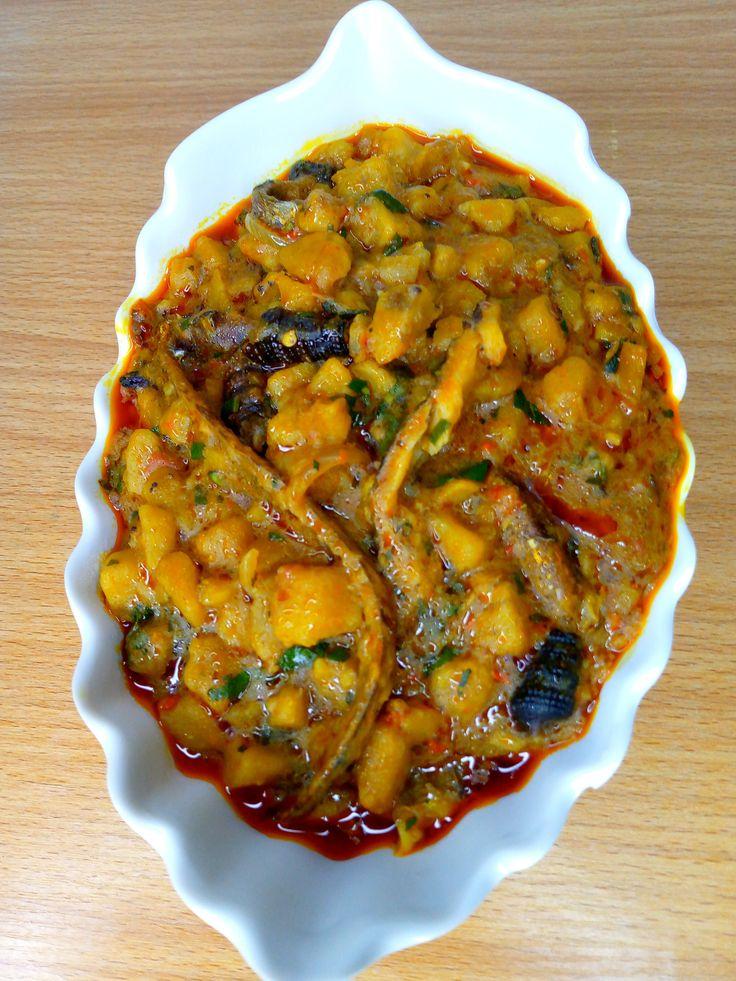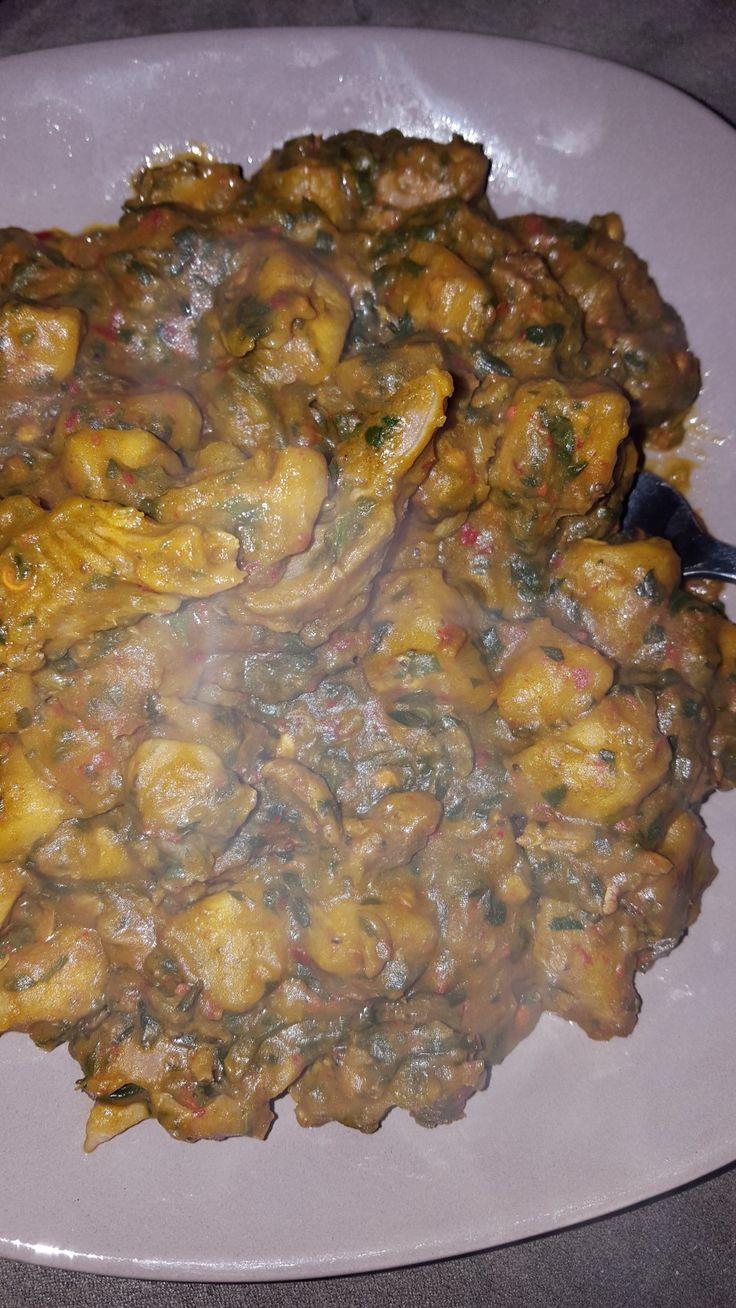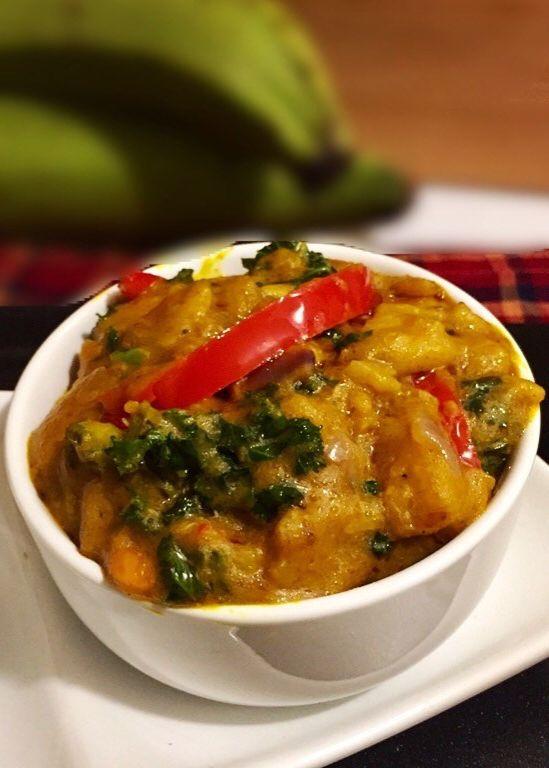
In many Igbo communities of southeastern Nigeria, food is not only about sustenance; it is part of a deeper, ancestral knowledge system. One dish that stands out for both its cultural relevance and health-promoting properties is unripe plantain porridge. Locally known as "ogede na-adi ocha" in the Igbo communities or "okwuruji ji agwo oria" ( loosely translating to "plantain that cures sickness" ), this humble meal is widely prepared in homes not only for its taste but also for its traditional remedy. Traditionally made with green (unripe) plantains, and often cooked with palm oil, scent leaf (nchuanwu), crayfish, or any other protein sources like dried fish, sometimes vegetables like pumpkin leaves (ugwu) and pepper, this dish is deeply rooted in Igbo dietary practices; especially in managing illness, supporting blood health, and providing strength during recovery. This article traces the culinary roots, preparation method, and medicinal value of unripe plantain porridge in Igbo culture, shedding light on how one meal can connect tradition, nutrition, and wellness.
Origins and Cultural Roots
Unripe plantain, known locally as ogede na-adi ocha or ogede oji, has long held a central place in Igbo traditional diets. While plantain itself is widely consumed across West Africa, the Igbos specifically prefer the unripe variety for medicinal and dietary purposes. Historically, this dish was often prepared for new mothers during postpartum recovery, elderly persons needing strength, children recovering from illness, and men returning from long journeys or farm work. Among the Nsukka, Awka, and Imo Igbo-speaking communities, it is not uncommon to hear elders say "ogede oji na-eme ka ọbara sie ike", meaning “unripe plantain strengthens the blood.” This reflects long-held beliefs about its role in replenishing iron levels, regulating blood sugar, and building body strength. The dish was typically prepared over firewood in clay pots, enhancing its earthy aroma. Its simplicity made it both accessible and valuable, especially in times when processed or imported foods were scarce.
A typical Igbo-style unripe plantain porridge includes the following ingredients:
1. Unripe plantains
2. Palm oil
3. Crayfish
4. Dried fish
5. Pepper
6. Onions
7. Scent leaf (nchuanwu) or pumpkin leaf (ugwu).
Preparation involves peeling and slicing the plantains into small chunks, boiling them in water until semi-soft, and then adding ground crayfish, pepper, onions, and palm oil. The vegetables are usually added at the end to retain their nutrients. The final result is a thick, hearty, and deeply flavorful porridge.

Health Benefits Recognized In Igbo Communities
Unripe plantain porridge is widely regarded in Igbo traditional medicine for its healing and strengthening properties. Some of the recognized benefits include:
• Blood sugar control: Due to its low glycemic index, it helps regulate blood sugar levels, especially in diabetic or pre-diabetic individuals. Which means it releases sugar slowly into the bloodstream. It is commonly recommended by herbalists and health workers in Igbo communities for managing type 2 diabetes. The fiber in the plantain helps slow carbohydrate absorption.
• Improved blood health: Iron-rich vegetables like ugwu are believed to help prevent or treat anemia. When cooked with iron-rich vegetables like ugwu (pumpkin leaf) or nchuanwu (scent leaf), the porridge is believed to “build blood” and is often given to new mothers, girls after their first menstruation, and anemic patients.
• Digestive support: The fiber in unripe plantains aids digestion and helps with constipation. It is rich in dietary fiber, which promotes regular bowel movements and helps cleanse the gut. In traditional Igbo homes, it is often given to people with constipation or mild stomach upset.
• Post-illness recovery: Commonly cooked for people recovering from typhoid, malaria, or childbirth.
• Strength and energy: Provides sustained energy for farmers and laborers due to its complex carbohydrates. Though unripe, it still provides complex carbohydrates, which release energy slowly and sustain the body. Farmers, laborers, and students often eat it in the morning to stay strong through long hours of work.
Also, a 2015 study published in the Nigerian Journal of Nutritional Sciences noted its role in helping patients manage ulcer symptoms and inflammation. The mucilage (a sticky substance) from unripe plantain coats the stomach lining and reduces acidity. Herbal practitioners use it for managing ulcer symptoms, often paired with native herbs or palm kernel oil. These health beliefs are passed down from generation to generation through oral tradition, experience, and cultural teachings. Modern research and nutritional analysis support many of the traditional claims. Unripe plantains are known to be high in dietary fiber, which improves gut health, rich in potassium and magnesium, important for heart and muscle function, and contain resistant starch, which functions like soluble fiber, low in natural sugars, making them ideal for blood sugar regulation. Today, nutritionists recommend unripe plantains for people seeking to avoid processed or sugary carbohydrates. Despite the increasing influence of modern and foreign diets, unripe plantain porridge remains a staple in many Igbo homes. It is a cultural belief of the Igbos that food and medicine are interconnected. This dish represents how indigenous food systems are not just nutritional, but therapeutic. It remains a popular meal among health-conscious individuals and is even included in some wellness-based meal plans. Unripe plantain porridge is more than a meal; it is a symbol of cultural knowledge and practical nutrition. Its long-standing place in Igbo kitchens reflects the value of traditional wisdom, especially in the area of food-based healing. As more Africans look inward to rediscover ancestral knowledge, this humble dish stands as a reminder that healing often begins with what we eat.

References
- Nigerian Journal of Nutritional Sciences (2015). Nutritional and Therapeutic Benefits of Musa Paradisiaca (Unripe Plantain).
- Oko, A.O. et al. (2017). Food as Medicine: A Review of Traditional African Dietary Practices. University of Nigeria, Nsukka.
- Interview with Mrs. Ngozi Onuoha, Herbalist & Midwife, Enugu (2022).
- WHO Africa (2021). Traditional Diets and Non-Communicable Disease Prevention in Sub-Saharan Africa.
Photo credit: Pinterest
Join the Oriire Community
Become a free member to get the monthly roundup, unlock more challenges, comment on articles and bookmark your favourites





















Share
0 Comments